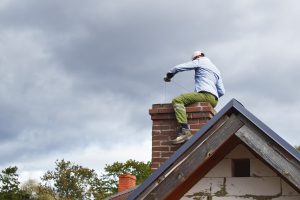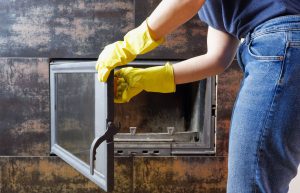Chimneys and fireplaces are beautiful features to have in a home. Not only do they help you warm up during the cold winter months, but they also create an atmosphere of security and hominess. However, unless you have a fireplace insert with an electric fireplace, a chimney is also a feature that needs to be maintained and cleaned.
It can be hard to know when to do it if you’ve never had your chimney cleaned. But there are a few signs that you should look for to decide if it’s time for a cleaning. A buildup of soot and creosote can block airflow and cause a fire, so staying on top of things is crucial. Even worse, blocked indoor fireplaces can cause carbon monoxide to build up in the living space of your house and endanger your family’s health. Be aware of the symptoms of carbon monoxide poisoning so you can protect your health.
1. What are the signs that your chimney need a clean up? Check them all.
2. Interior fireplaces – should you clean them? Read on to find out.
How Frequently Should Chimney Cleaning Occur?
In general, a professional should inspect your fireplace and chimney annually. The best time to check your chimney is in the fall or early winter. Fall and early winter are good times for an inspection because animals or birds will often use your chimney as a nesting place during the warmer spring and summer seasons. An inspector will not only inform you if you need a chimney repair Chicago, but they will also advise you on when you should contact them for your next service date.

How To Know When To Clean Chimney?
Keep reading for a few tips on how to tell if your chimney needs some attention.
Sooty and Smokey Surroundings
One of the most obvious warning signs that your chimney needs cleaning is sooty and smokey surroundings. If you notice soot or smoke around your fireplace, that’s a sure sign that your chimney needs cleaning. Soot appears whenever wood is burned and can build up in your chimney over time. If left unchecked, soot can eventually cause a chimney fire. Not only is soot a fire hazard it can also leave ugly black smudges around the edges of your fireplace, making the interior of your home less attractive.
Smoke around your fireplace indicates that your chimney isn’t drawing airflow correctly and needs cleaning. There are multiple causes for blockages in chimneys, including:
- Bird nests: Birds are attracted to the warmth of the chimney and will build nests there if given the opportunity. These nests can quickly become packed with twigs and leaves, blocking the chimney and posing a severe fire risk. Typically, the best solution is preventative: install a chimney cap to prevent birds from ever gaining access to the inside of the chimney. Consult a professional or learn how to install a chimney cap yourself.
- Animals: Small animals often build nests in chimneys, leading to blockages. If you suspect that there may be an animal in your chimney, you should call a professional company for assistance. The best way to prevent this is to be proactive and install a chimney cap.
- Maintenance: Poorly maintained fireplaces can also cause chimney blockages. If you don’t properly clean your fireplace after each use, ashes and soot can build up and eventually cause a blockage. To help avoid this, be sure to sweep out your fireplace regularly.
Creosote Buildup
Creosote is a tar-like substance and natural byproduct of burning wood in your fireplace. As the wood burns, the smoke rises up the chimney, where it condenses and forms a sticky residue on the chimney walls. Over time, this creosote can build up to create a thick layer that can block the chimney, preventing smoke from escaping. Creosote buildup can be dangerous because it can cause the smoke to back up into the room, leading to unhealthy air quality. Creosote can also cause hazardous fires inside your chimney. When creosote ignites, it burns at a very high temperature and can quickly spread to the rest of the house.
How To Prevent Creosote Buildup
Fortunately, you can take steps to reduce the creosote buildup that naturally occurs in your chimney.
- Make sure that your chimney is clean and free of debris. A cleaning involves regularly inspecting your chimney for bird nests, animals, and other material that may exacerbate your creosote issue.
- Burn only dry, seasoned wood in your fireplace. The moisture content of the wood affects the rate of combustion and the amount of creosote produced. Wet or green wood produces more smoke and will contribute to more creosote buildup.
- Last but definitely not least, have your chimney cleaned regularly by a professional chimney sweep. Over time, creosote will harden and form deposits that can block the chimney and hamper proper ventilation. So even if you don’t notice any serious issues with your chimney’s airflow, it is still a good idea to have it inspected for creosote. That way, a professional can remove the existing creosote before it escalates to a complete blockage or fire.
Fires Take A While To Get Started
Another clear sign that it’s time to have the chimney cleaned is if you find that it takes a while to get a fire started. Difficulty starting a fire is due to a blockage in the chimney, which is typically caused by animal nests or soot and creosote buildup. Birds or other animals nesting in the chimney can block efficient airflow and will sometimes even ignite, causing a dangerous chimney fire. A buildup of soot and creosote in the chimney can act as insulation, making it difficult for heat to escape. As a result, it can take longer to light a fire, and the fire may not be as hot as it should be. This issue will also increase the chances of a chimney fire.
Oil Marks On Fireplace Walls
One significant sign that it’s time for a chimney cleaning is if you see oil marks on the walls of your fireplace. These marks appear when wood combustion oil collects on the chimney’s sides. Over time, this oil can build up and create a fire hazard. Oil marks also indicate that your chimney is not drawing correctly, which can lead to smoke and fumes entering your home.
Water Leaks
If you’ve ever noticed water leaks around your chimney, it’s crucial to take action immediately. While it may seem like a small problem, water leaking from your chimney can be a sign that your chimney needs cleaning. Water leaking from a chimney is usually a sign that the flue—the part of the chimney that vents smoke and gases—is blocked or damaged. Water can seep in when the flue is blocked and cause stains or even structural damage. Water leaks can also lead to mold and mildew growth, which can lower the air quality of your home.
Animal Nesting
If you’ve ever had an animal nesting in your chimney, you know it’s not a pleasant experience. Not only are animals’ and bird’s nests a nuisance, they can also literally be hazardous to your health. Animals can carry diseases and parasites that can harm humans, and their droppings can contaminate your fireplace. Animals can also cause damage to your chimney by chewing on bricks and mortar.

What About Electric Fireplaces and Gas Fireplaces?
Electric fireplaces
Electric fireplaces do not typically require cleanings as traditional fireplaces do. However, it is always a good idea to clean off any dust that may have accumulated around the inlet and outlet part of the electric fireplace.
Gas Fireplaces
Unlike traditional wood-burning fireplaces and chimneys, a gas fireplace does not accumulate creosote, a byproduct of burning wood. However, gas fireplaces still create a buildup of byproducts that need removal. Contact a professional chimney sweep for more information.
If you see any of these signs, it’s time to call in masonry contractors Chicago who can deal with the problem and get your chimney cleaned. A clean chimney is integral to keeping your home safe from fires and helps ensure that your fireplace works correctly.
